

#In recent years, with the emergence of new technology models, the polishing of the value of application scenarios in various industries and the improvement of product effects based on the accumulation of massive data, artificial intelligence applications have evolved from Consumption, Internet and other fields will radiate to traditional industries such as manufacturing, energy and electricity. The maturity of artificial intelligence technology and application in enterprises in various industries in the main links of economic production activities such as design, procurement, production, management, and sales is constantly improving, accelerating the implementation and coverage of artificial intelligence in all links, and gradually integrating it with the main business , in order to improve industrial status or optimize operating efficiency, and further expand its own advantages.
The large-scale implementation of innovative applications of artificial intelligence technology has promoted the vigorous development of the big data intelligence market, and also injected market vitality into the underlying data governance services.
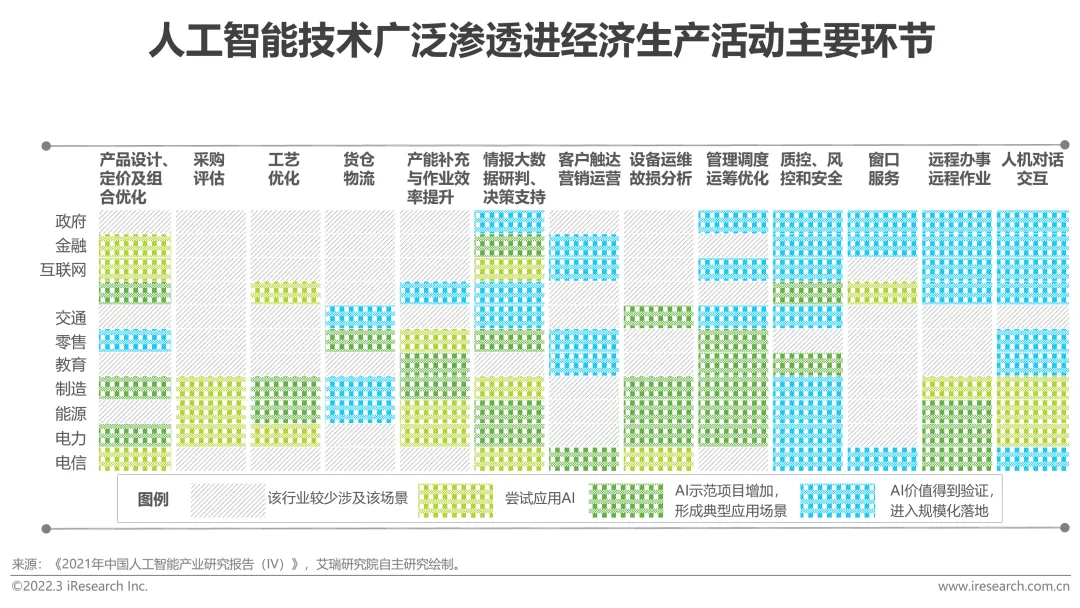
With the development of big data, cloud computing and algorithms, the craze of artificial intelligence has started from a few years ago. It continues to this day and is widely used in many industries and fields, becoming a leading technology in the ongoing technological revolution. And how can artificial intelligence be absent from the booming field of data governance? Data governance and artificial intelligence are two seemingly unrelated words. When they are put together, what story will happen?
Big data is the accumulation of data that is continuously accumulated, cleaned, converted, classified, etc., and Data governance provides a more standardized management model for the presentation of big data. Since most current forms of artificial intelligence require a large amount of data calculations, they are inseparable from the support of big data and data governance. Artificial intelligence needs to rely on big data platforms and technologies to help complete the evolution of deep learning.
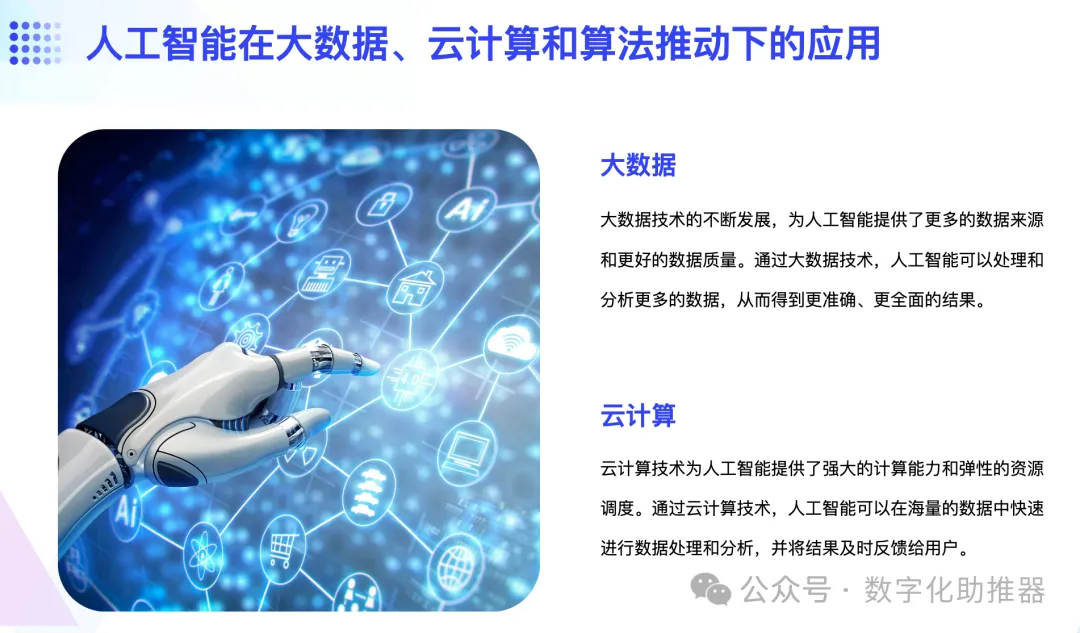
大Some artificial intelligence is divided into two links: training and prediction. The effect of machine training algorithms depends on the quality of the input data. If the input data is biased, the output algorithm will also be biased, which may directly lead to the unusability of the obtained results. Data governance plays an important role in improving data quality. By sorting out data quality requirements, defining data quality inspection rules, formulating data quality improvement plans, designing and implementing data quality management tools, and monitoring data quality management operating procedures and performance, enterprises can obtain clean and clearly structured data. , providing trusted data input for artificial intelligence technologies such as deep learning.
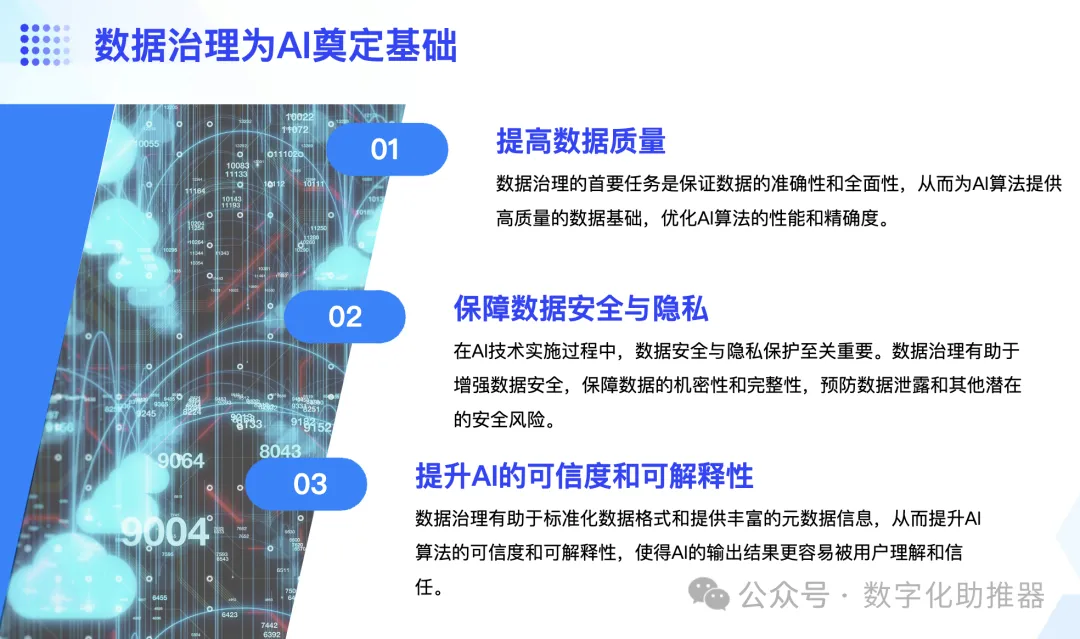
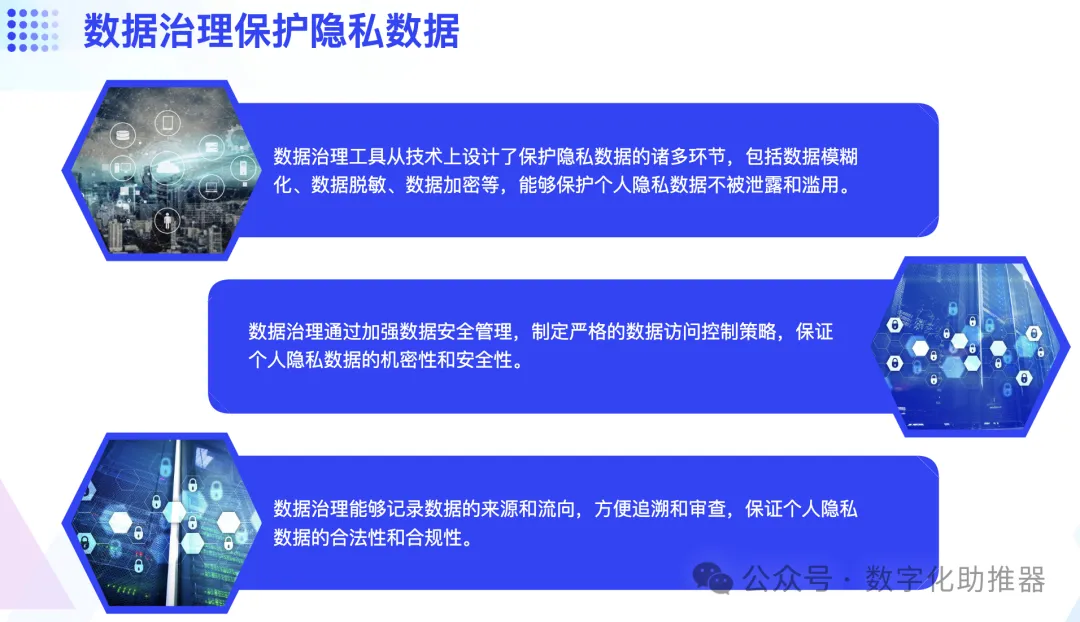
#The biggest restriction currently facing the development of artificial intelligence is the issue of data ownership and privacy protection. Personal privacy data should be protected. The misuse of this data may cause huge property losses or even personal injury to individuals. The so-called privacy protection is actually the protection of private data. In the final analysis, it is the privacy protection of data users. Data governance tools design many aspects of protecting private data from a technical level, providing data fuzzification, data desensitization, and data encryption, which can lay the foundation for corporate personal data protection, thereby achieving data compliance for artificial intelligence applications.
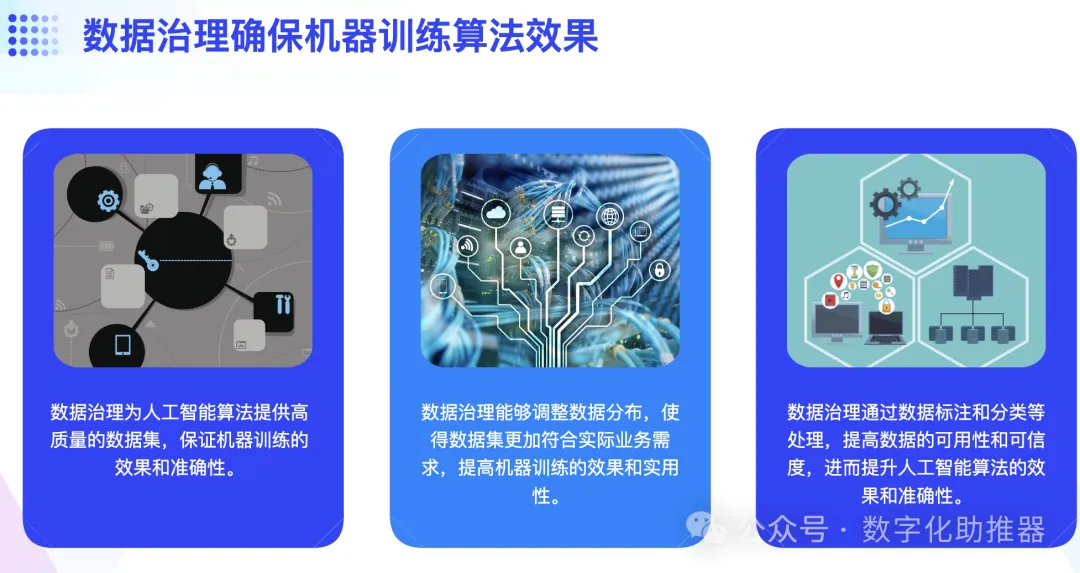
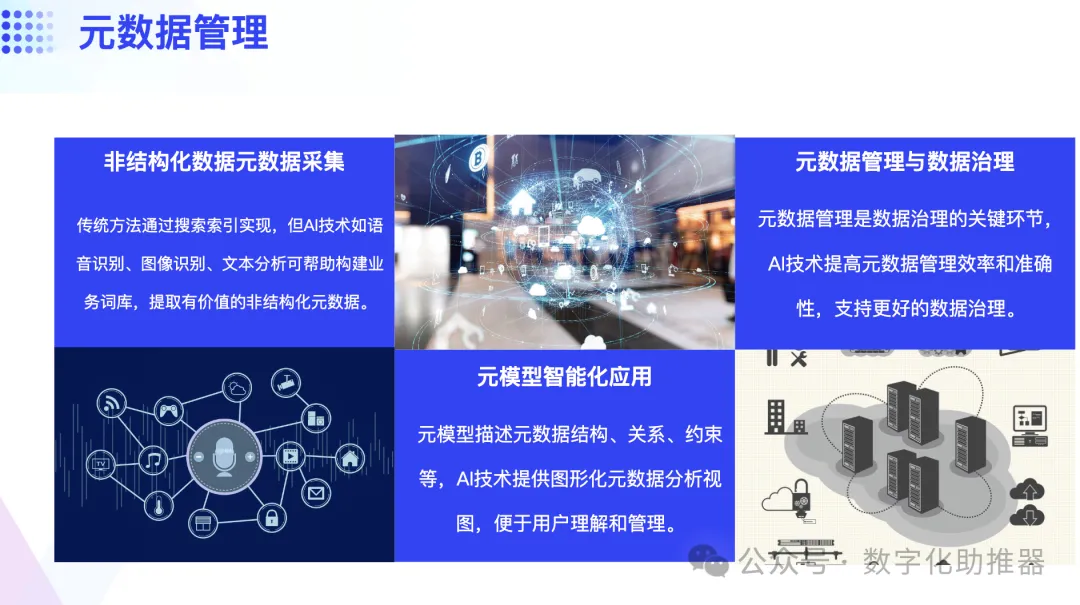
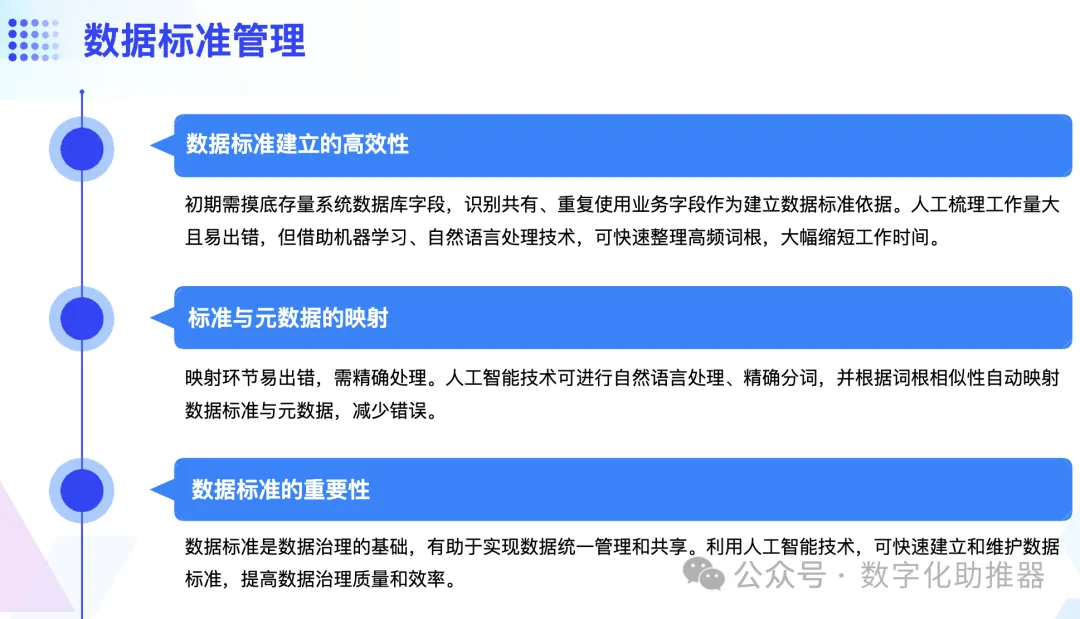
In the early stage of the implementation of data standards, it is necessary to manage the existing systems Conduct a thorough survey of database fields to identify common and reused business fields as a basis for establishing data standards. If it is all done manually, it will require the coordination of a large number of personnel from various business departments, which will result in a huge workload and is prone to errors. With the help of machine learning and natural language processing technology, high-frequency roots can be quickly sorted out based on field business names, and work that may take months can be completed in a few days.
Another important aspect of data standards management is the mapping of standards and metadata. In many business systems, mapping data standards to the metadata of business systems is often a nightmare for implementation engineers, and it is easy to make mistakes if you are not careful. With artificial intelligence technology, we can perform natural language processing on business field names, accurately segment words, and automatically map data standards and metadata based on root similarity.
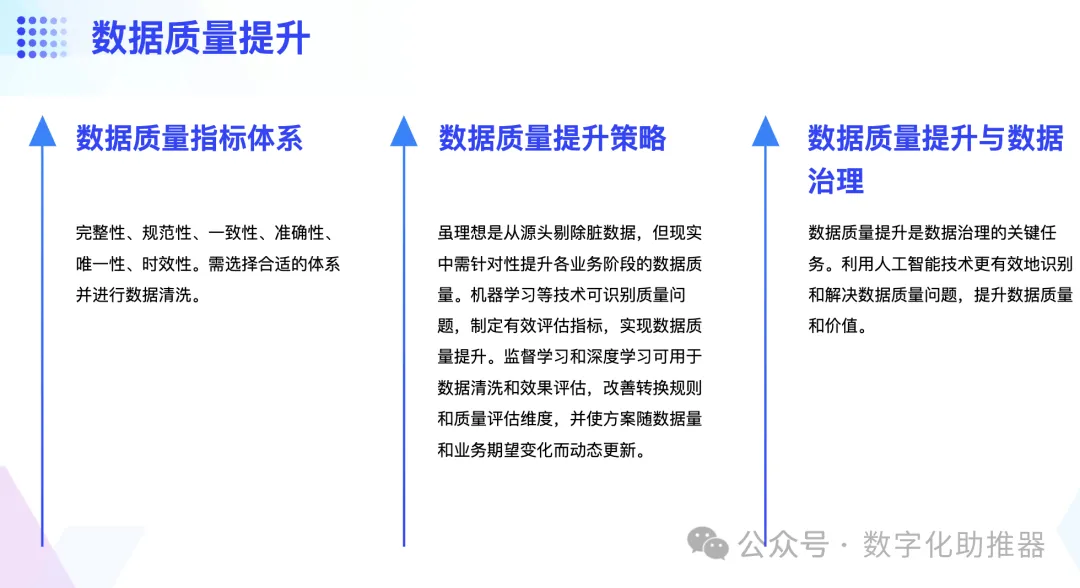
##Data quality is to ensure data efficiency Application basis. The index system for measuring data quality includes completeness, standardization, consistency, accuracy, uniqueness, and timeliness. Before implementing the data quality improvement plan, it is necessary to select an appropriate data quality indicator system based on different business rules and business expectations, and clean the data.
The ideal model for general data quality improvement is to remove dirty data from the data source, but this is not feasible in reality. Therefore, according to business expectations, data quality at each business stage should be improved in a targeted manner. Machine learning (such as classification learning, clustering, regression, etc.) can extract and identify existing quality problems, thereby formulating effective data quality assessment indicators and maximizing the improvement of data quality under this indicator. At the same time, supervised learning and deep learning will also enable the evaluation of data cleaning and data quality effects, thereby improving conversion rules and data quality evaluation dimensions, and dynamically updating data quality improvement plans as data volume and business expectations gradually change.
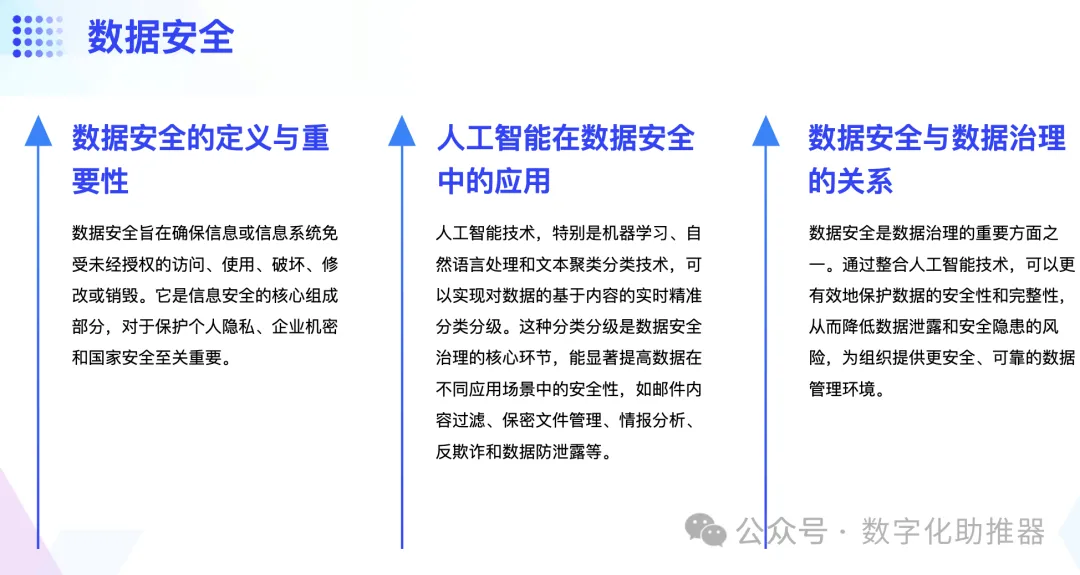
5. Master data management
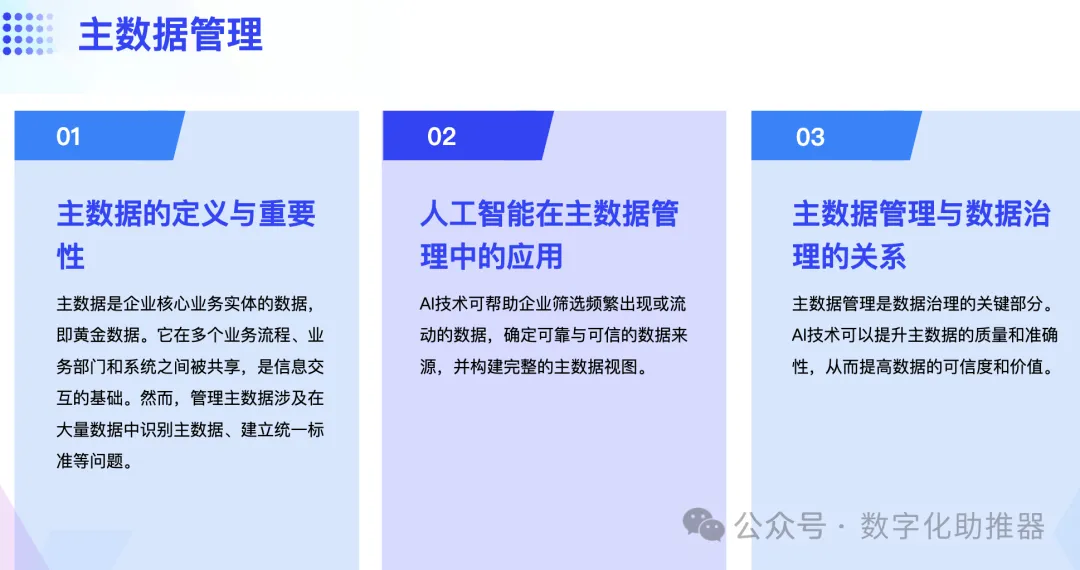 ##Master data refers to the core business of the enterprise Entity data, also called golden data, is basic data that is repeated and shared across the entire value chain and used in multiple business processes, and shared between various business departments and systems. The basis for information exchange. However, in the process of master data management, enterprises may face problems such as how to identify master data among a huge number of data items and how to establish unified master data standards.
##Master data refers to the core business of the enterprise Entity data, also called golden data, is basic data that is repeated and shared across the entire value chain and used in multiple business processes, and shared between various business departments and systems. The basis for information exchange. However, in the process of master data management, enterprises may face problems such as how to identify master data among a huge number of data items and how to establish unified master data standards.
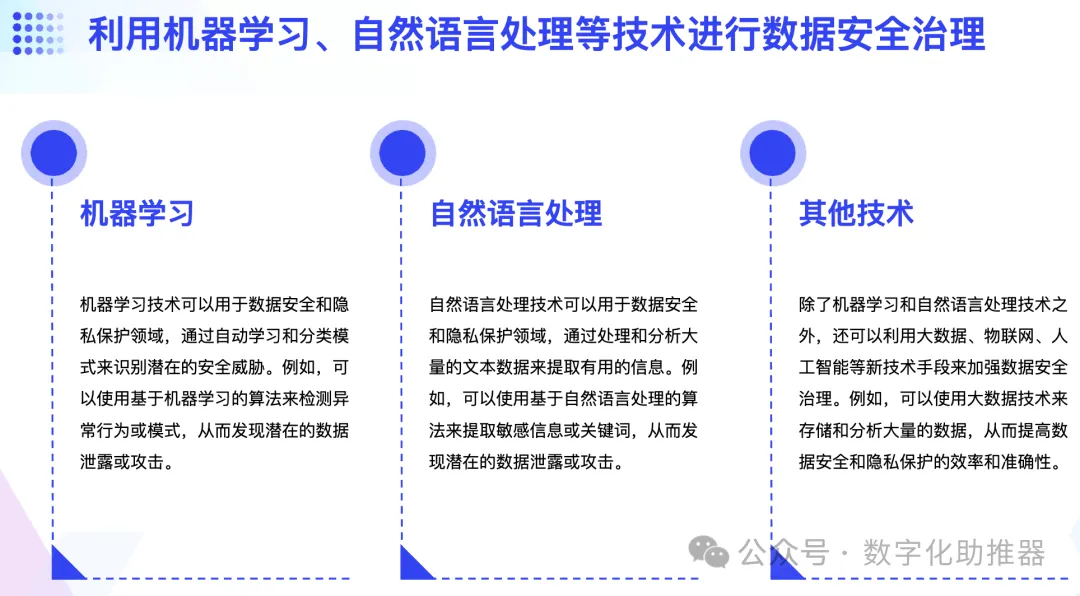 Determining master data depends on the enterprise’s understanding of business needs and the definition of corresponding “golden data”. Generally speaking, each master data subject area has its own dedicated record system and is scattered in various business systems. Artificial intelligence-related technologies can help us filter out frequently appearing or flowing data from all data, while quickly determining the reliable and trustworthy data sources of master data and building a complete master data view.
Determining master data depends on the enterprise’s understanding of business needs and the definition of corresponding “golden data”. Generally speaking, each master data subject area has its own dedicated record system and is scattered in various business systems. Artificial intelligence-related technologies can help us filter out frequently appearing or flowing data from all data, while quickly determining the reliable and trustworthy data sources of master data and building a complete master data view.
6. Artificial intelligence helps duplicate data automatically match and merge data
One of the challenges faced by digital drama management is to match and merge the same data items or duplicate data items in numerous systems of the enterprise. One way to solve this challenge is to build data matching rules, including different confidence levels. match acceptance. Some matches require a very high level of trust and can be based on accurate data matching across multiple fields; some matches can be achieved with a lower level of trust simply due to conflicting data values. Machine learning and natural language processing can help establish matching rules for duplicate data identification. After identifying master data with duplicate fields, automatic merging will not be performed, and records related to the master data can be determined and cross-reference relationships established.
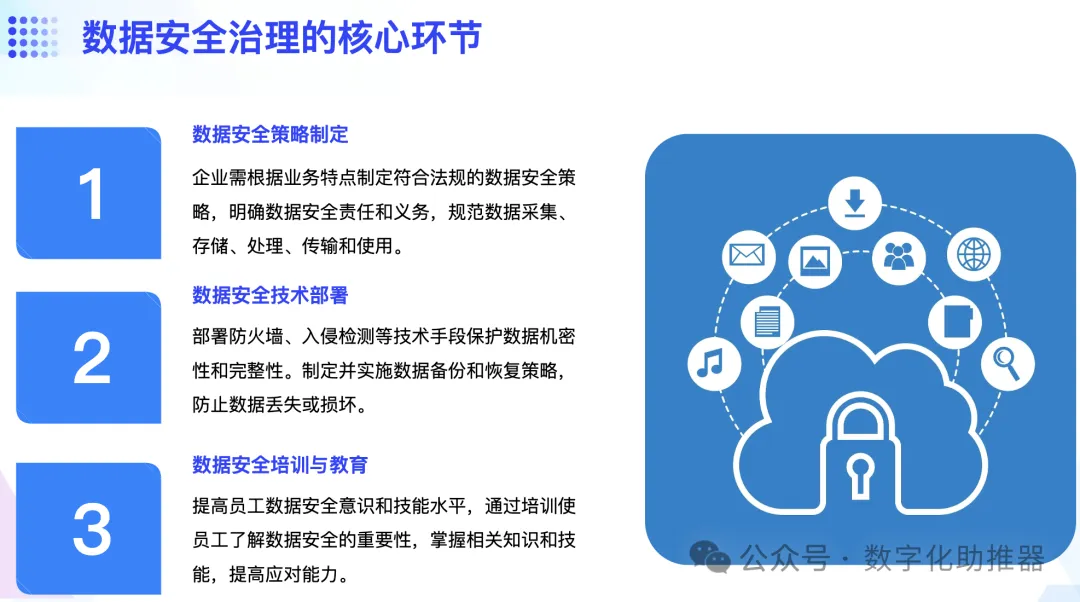
Lowering the threshold of data governance through artificial intelligence technology will become an important direction for the development of data governance. Taking full account of the high complexity of data governance, the data governance platform continues to integrate new AI technologies, striving to simplify the data governance implementation process through intelligent management, greatly liberating technical personnel, and helping enterprises achieve more efficient data governance and stay away from "data black hole".
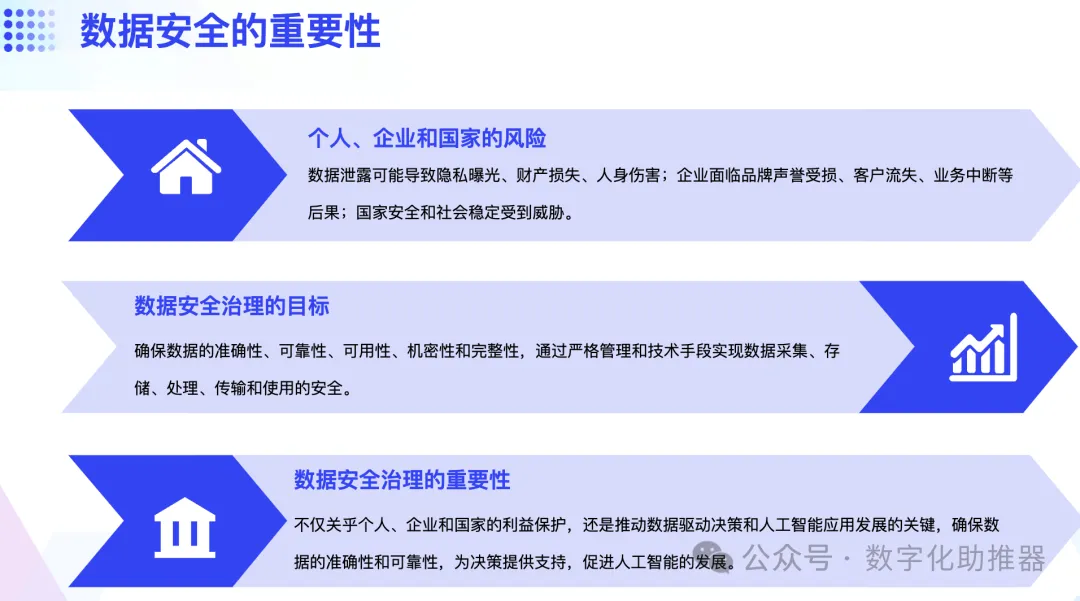
1. Intelligent metadata service.The Ruizhi platform supports fully automatic metadata collection and association, realizes intelligent application of metamodels, and provides graphical metadata analysis views.
#2. Intelligent exploration of data quality.The Ruizhi platform has built-in mathematical statistical algorithms and bound machine learning algorithms to automatically detect data quality and support intelligent repair.
#3. Intelligent construction of data standards.The Ruizhi platform supports intelligent mapping and marking, forming data standards and two-way evaluation of business data.
#4. Intelligent identification of master data.The Ruizhi platform automatically identifies master data, helps duplicate data automatically match and merge, and builds a complete master data view.
With the rapid development of data governance and artificial intelligence, the integration of the two will lead to more scenarios and business models.
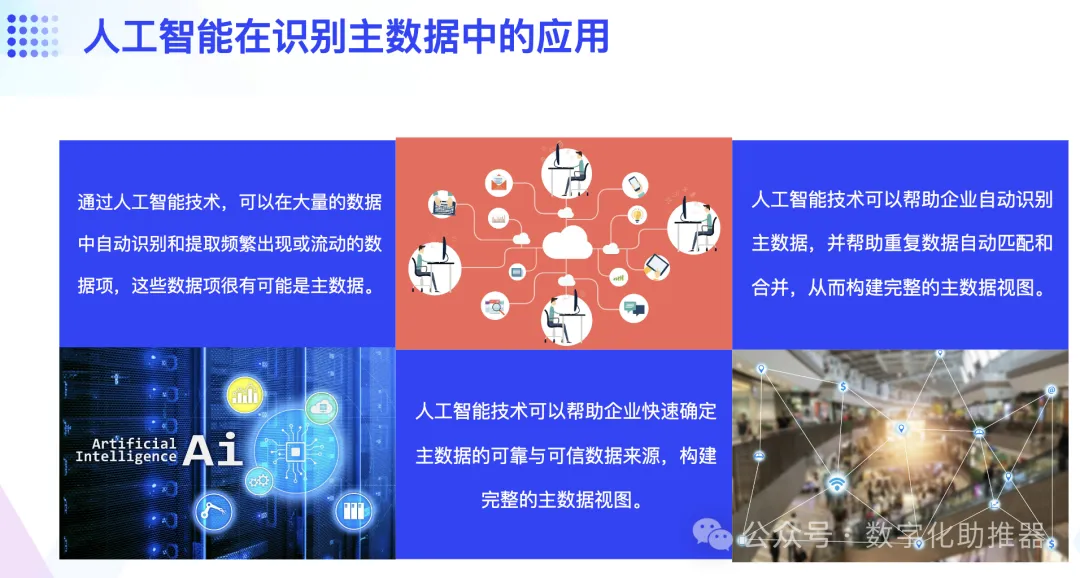
When enterprises deploy AI applications, the quality of data resources greatly determines the effectiveness of AI applications. Therefore, in order to promote the high-quality implementation of AI applications, carrying out targeted data governance work is the first and necessary step. As for the traditional data governance system that the enterprise has built, it currently focuses on optimizing the governance of structured data. It is still difficult to meet the needs of AI applications in the dimensions of data quality, data field richness, data distribution and data real-time. Data quality requirements.In order to ensure the high-quality implementation of AI applications,enterprises still need to carry out secondary data governance for artificial intelligence applications.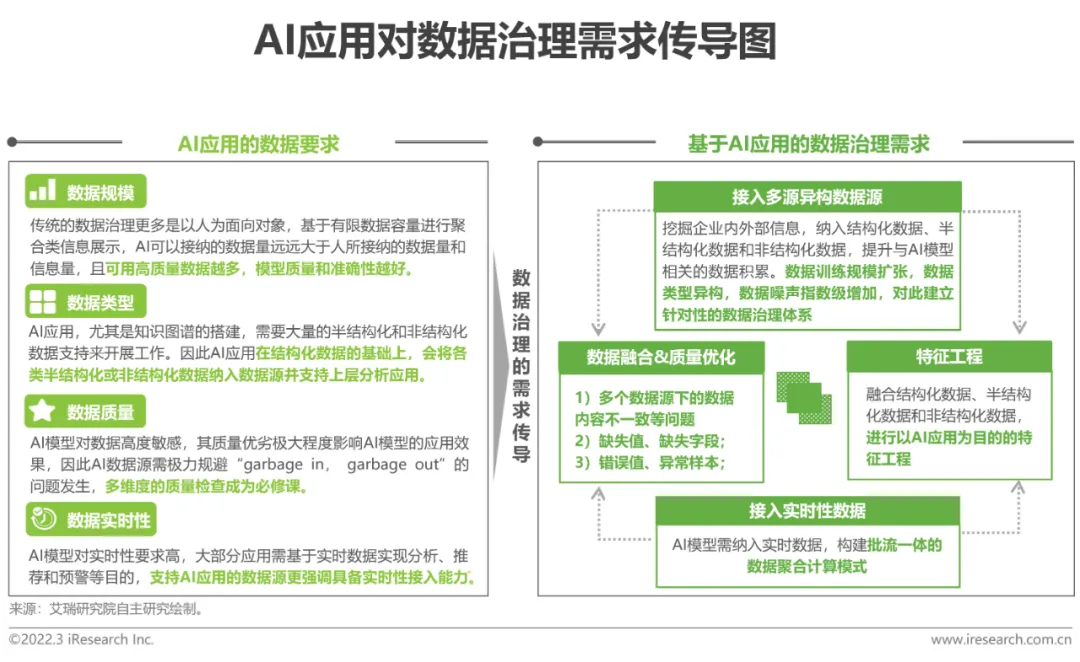
Artificial intelligence-oriented data governance is an “upgrade” of the traditional data governance system guided by the implementation of AI applications.
From the perspective of data management, the data governance system for artificial intelligence will still adapt to the construction of elements based on data structured flow, data asset management needs, data security needs, etc. Component modules such as data management, data asset management, master data management, data life cycle management, and data security and privacy management. In thedata governance process, more emphasis will be placed on the bottom layer to achieve multi-source data fusion, data collection frequency, data standard establishment, and data quality management to meet the scale, quality, and timeliness of data required for AI models, and to meet the needs of AI applications. Data requirements are the core and the system construction of corresponding modules is optimized.
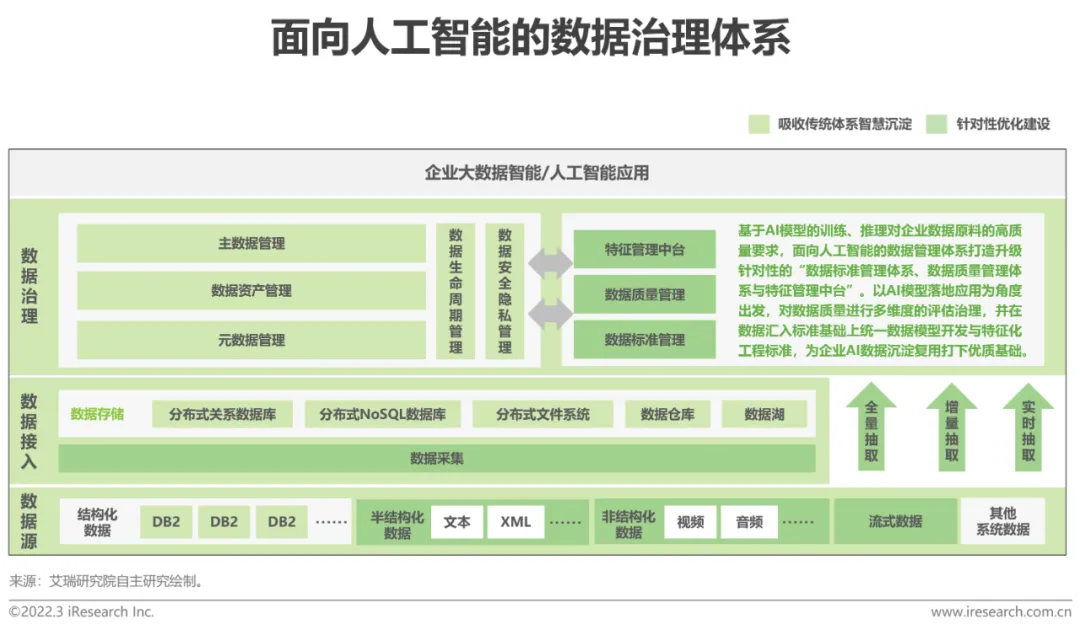
Artificial intelligence-oriented data governance services are often included in data Among the three types of procurement forms are services, platform capabilities and data products. The first category, data services appear in the form of separate data governance products; the second category, data platform, mainly includes big data platform, data middle platform, data warehouse and AI capability platform and other projects; the third category, data products, scope Data products limited to the application of AI algorithms can be divided into three types of AI products: machine learning products, natural language understanding products and knowledge graphs.
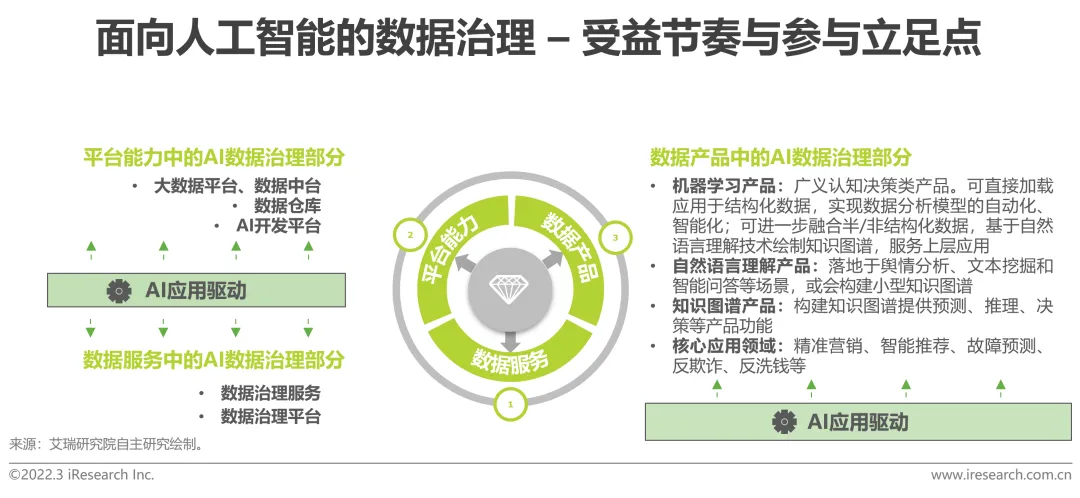
Nowadays, the demand for AI products is strong, and the AI development platform has successively promoted the large-scale implementation of AI products, and the effect of AI data governance Closely linked to the final platform product delivery effect.
Overall, the application of cutting-edge technology can make data governance work more streamlined, automated and intelligent, while making data scalable, more accountable and traceable. , more trustworthy, has become the only way for the future development of data management.
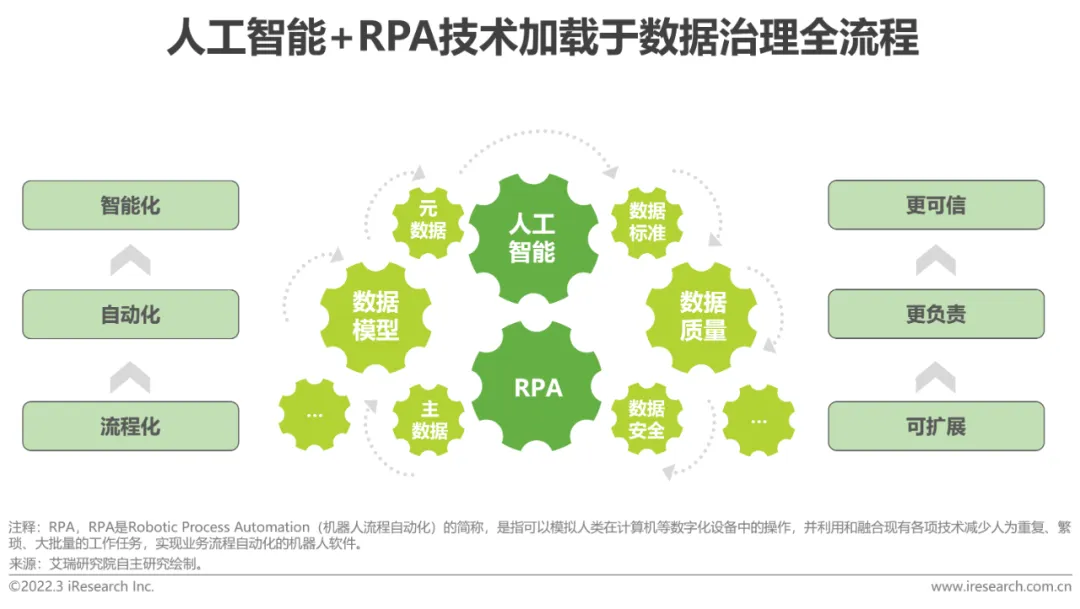
Interrelated , rely on each other, and jointly promote the internal and external development of artificial intelligence applications
Artificial intelligence-oriented data governance makes full use of machine learning technology to automate and intelligentize the data governance process, which can be extremely Greatly improve the efficiency of data governance, and at the same time mine the application value of associated unstructured data based on natural language understanding and knowledge graphs, solve the traditional problems of data quality management, and make the cured data more in line with the requirements of AI applications,From the perspective of efficiency and quality to promote the implementation of AI models.
At the same time, the significant optimization of the implementation effect of AI applications will also bring more confidence to enterprises in intelligent transformation, allowing them to increase their investment in related AI projects. Budget investment to further promote the construction of relevant governance systems and create a virtuous cycle of "governing AI"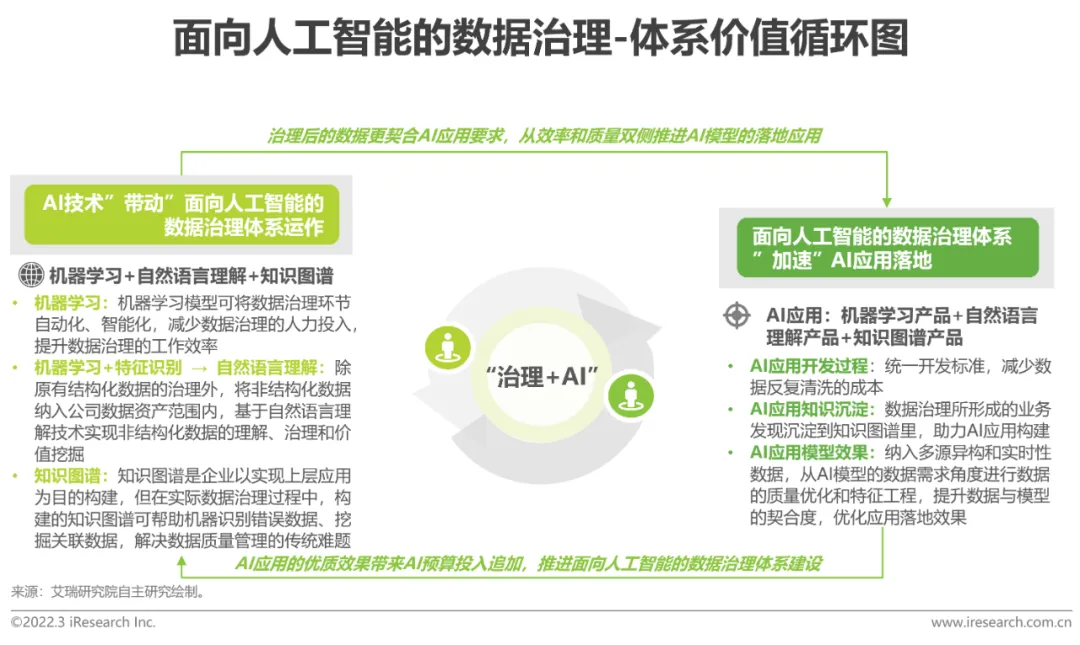
The above is the detailed content of How to build an AI-oriented data governance system?. For more information, please follow other related articles on the PHP Chinese website!
 Application of artificial intelligence in life
Application of artificial intelligence in life What is the basic concept of artificial intelligence
What is the basic concept of artificial intelligence What are the website building functions?
What are the website building functions? Introduction to the main work content of the backend
Introduction to the main work content of the backend How to change ip address in linux
How to change ip address in linux The latest prices of the top ten virtual currencies
The latest prices of the top ten virtual currencies java regular expression syntax
java regular expression syntax How to use return in C language
How to use return in C language



